MBA502: Designing a Professional Workshop on Cultural Intelligence
VerifiedAdded on 2023/06/11
|11
|2825
|225
Report
AI Summary
This report presents a design for a professional development workshop focused on enhancing cultural intelligence skills for team managers at Coca Cola Amatil Limited. As a consultant, the workshop aims to train teams of 50 managers to effectively address intercultural issues. The report includes an introduction to cultural intelligence, emphasizing its four key aspects: motivational, behavioral, metacognitive, and cognitive. The workshop design incorporates activities such as case studies, feedback reports, personal development plan formulation, and experimental exercises. The evaluation of the workshop's success involves face-to-face meetings, performance scorecards, and self-reflection exercises, along with the establishment of a counseling cell to assist managers in resolving intercultural challenges. The ultimate goal is to improve cross-cultural performance, flexibility, and job performance, thereby enhancing the organization's profitability.
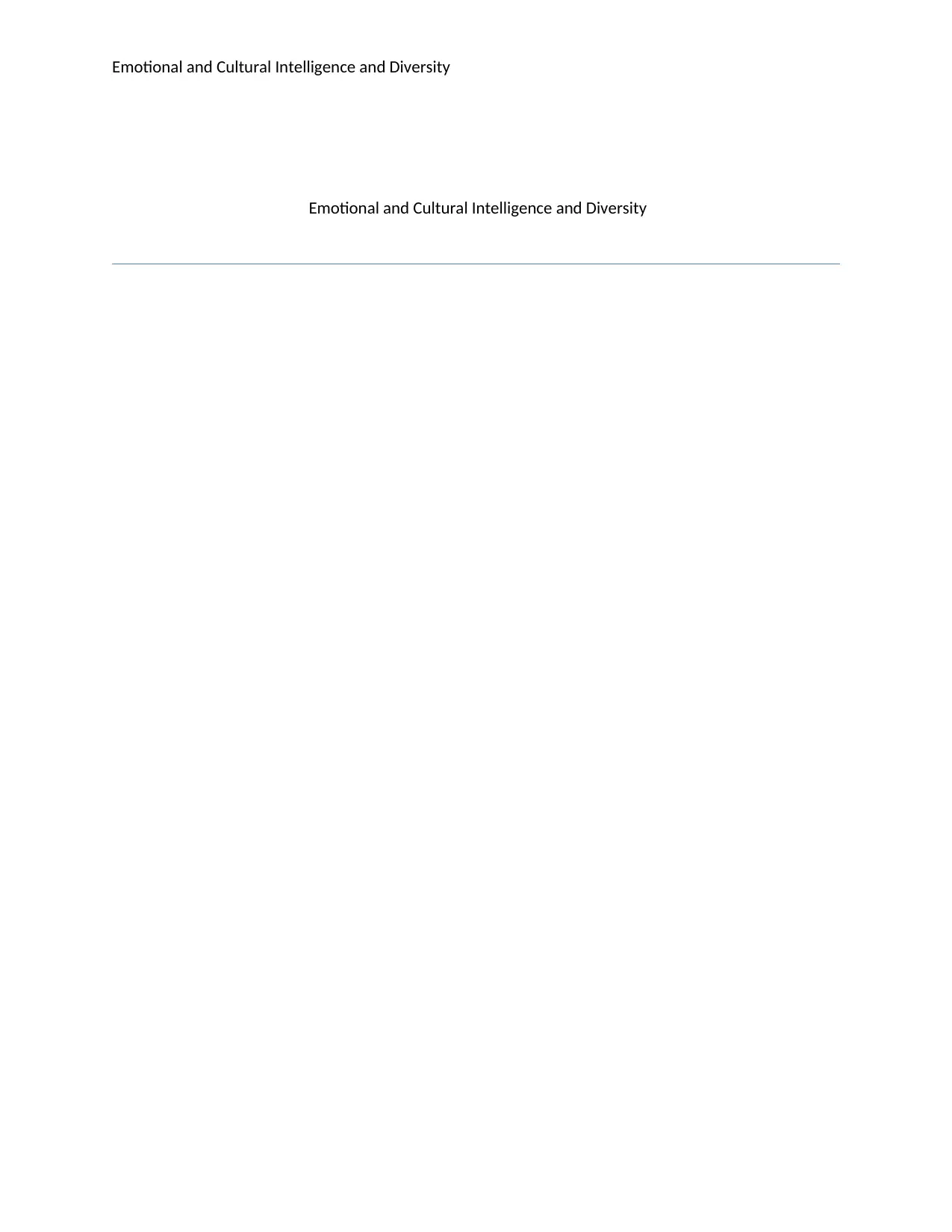
Emotional and Cultural Intelligence and Diversity
Emotional and Cultural Intelligence and Diversity
Emotional and Cultural Intelligence and Diversity
Paraphrase This Document
Need a fresh take? Get an instant paraphrase of this document with our AI Paraphraser
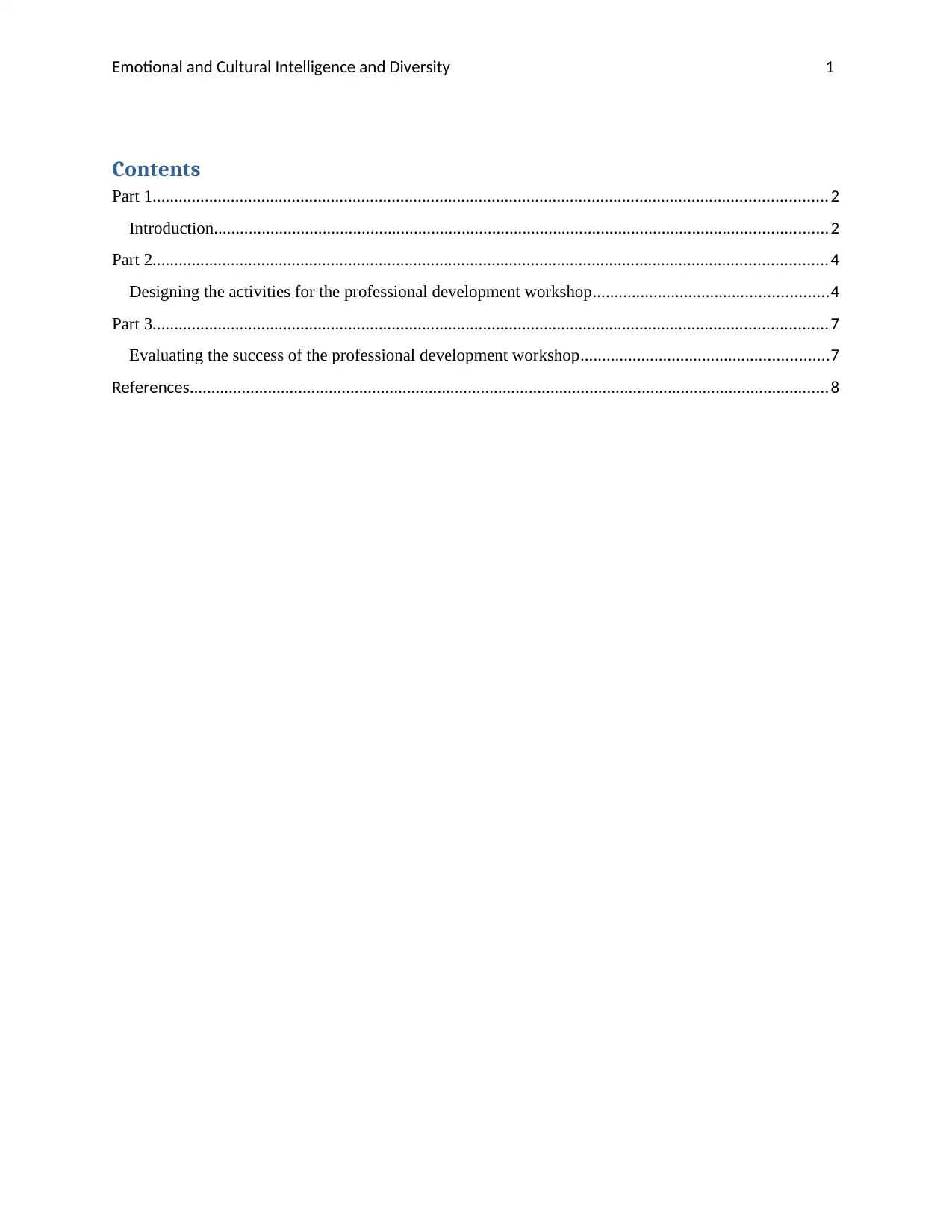
Emotional and Cultural Intelligence and Diversity 1
Contents
Part 1...........................................................................................................................................................2
Introduction.............................................................................................................................................2
Part 2...........................................................................................................................................................4
Designing the activities for the professional development workshop......................................................4
Part 3...........................................................................................................................................................7
Evaluating the success of the professional development workshop.........................................................7
References...................................................................................................................................................8
Contents
Part 1...........................................................................................................................................................2
Introduction.............................................................................................................................................2
Part 2...........................................................................................................................................................4
Designing the activities for the professional development workshop......................................................4
Part 3...........................................................................................................................................................7
Evaluating the success of the professional development workshop.........................................................7
References...................................................................................................................................................8
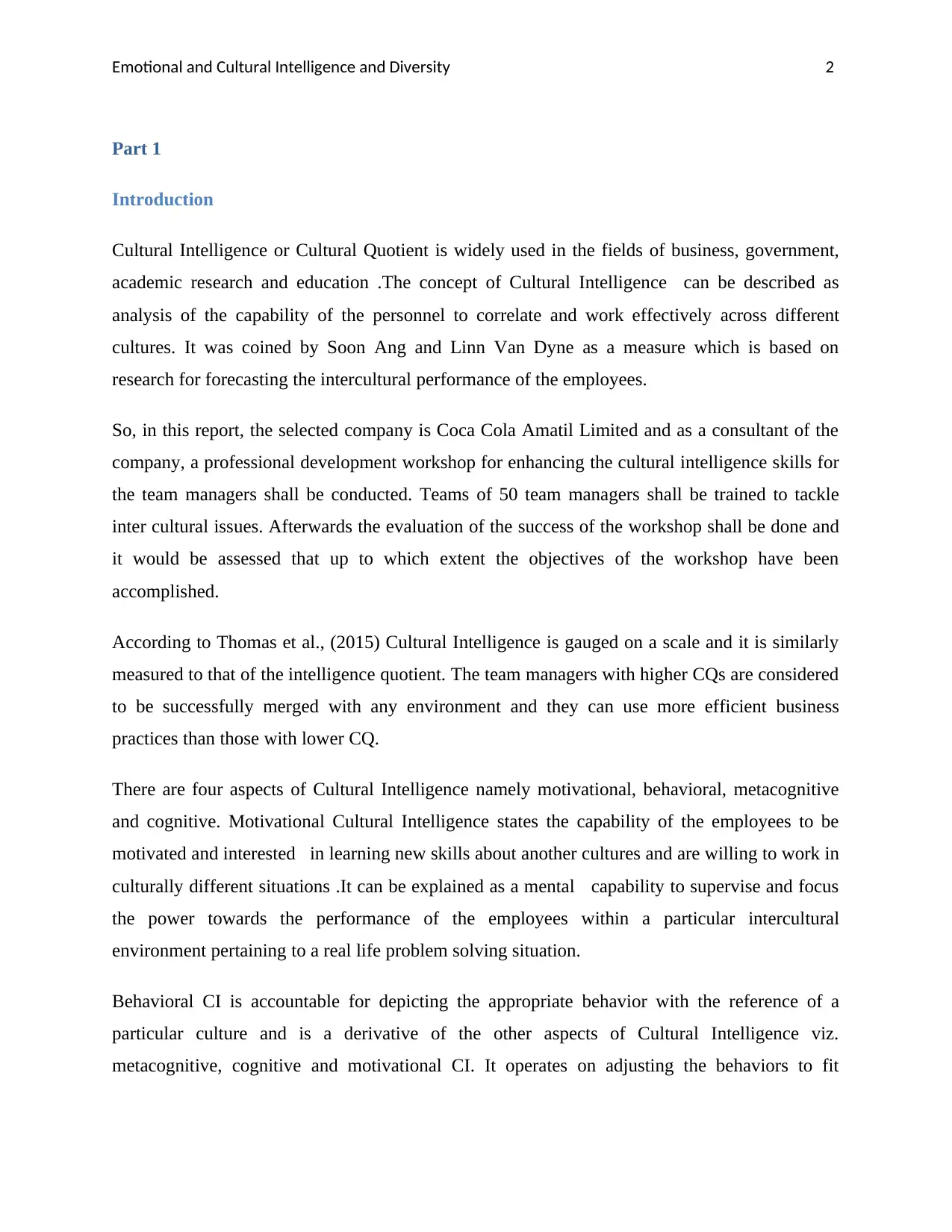
Emotional and Cultural Intelligence and Diversity 2
Part 1
Introduction
Cultural Intelligence or Cultural Quotient is widely used in the fields of business, government,
academic research and education .The concept of Cultural Intelligence can be described as
analysis of the capability of the personnel to correlate and work effectively across different
cultures. It was coined by Soon Ang and Linn Van Dyne as a measure which is based on
research for forecasting the intercultural performance of the employees.
So, in this report, the selected company is Coca Cola Amatil Limited and as a consultant of the
company, a professional development workshop for enhancing the cultural intelligence skills for
the team managers shall be conducted. Teams of 50 team managers shall be trained to tackle
inter cultural issues. Afterwards the evaluation of the success of the workshop shall be done and
it would be assessed that up to which extent the objectives of the workshop have been
accomplished.
According to Thomas et al., (2015) Cultural Intelligence is gauged on a scale and it is similarly
measured to that of the intelligence quotient. The team managers with higher CQs are considered
to be successfully merged with any environment and they can use more efficient business
practices than those with lower CQ.
There are four aspects of Cultural Intelligence namely motivational, behavioral, metacognitive
and cognitive. Motivational Cultural Intelligence states the capability of the employees to be
motivated and interested in learning new skills about another cultures and are willing to work in
culturally different situations .It can be explained as a mental capability to supervise and focus
the power towards the performance of the employees within a particular intercultural
environment pertaining to a real life problem solving situation.
Behavioral CI is accountable for depicting the appropriate behavior with the reference of a
particular culture and is a derivative of the other aspects of Cultural Intelligence viz.
metacognitive, cognitive and motivational CI. It operates on adjusting the behaviors to fit
Part 1
Introduction
Cultural Intelligence or Cultural Quotient is widely used in the fields of business, government,
academic research and education .The concept of Cultural Intelligence can be described as
analysis of the capability of the personnel to correlate and work effectively across different
cultures. It was coined by Soon Ang and Linn Van Dyne as a measure which is based on
research for forecasting the intercultural performance of the employees.
So, in this report, the selected company is Coca Cola Amatil Limited and as a consultant of the
company, a professional development workshop for enhancing the cultural intelligence skills for
the team managers shall be conducted. Teams of 50 team managers shall be trained to tackle
inter cultural issues. Afterwards the evaluation of the success of the workshop shall be done and
it would be assessed that up to which extent the objectives of the workshop have been
accomplished.
According to Thomas et al., (2015) Cultural Intelligence is gauged on a scale and it is similarly
measured to that of the intelligence quotient. The team managers with higher CQs are considered
to be successfully merged with any environment and they can use more efficient business
practices than those with lower CQ.
There are four aspects of Cultural Intelligence namely motivational, behavioral, metacognitive
and cognitive. Motivational Cultural Intelligence states the capability of the employees to be
motivated and interested in learning new skills about another cultures and are willing to work in
culturally different situations .It can be explained as a mental capability to supervise and focus
the power towards the performance of the employees within a particular intercultural
environment pertaining to a real life problem solving situation.
Behavioral CI is accountable for depicting the appropriate behavior with the reference of a
particular culture and is a derivative of the other aspects of Cultural Intelligence viz.
metacognitive, cognitive and motivational CI. It operates on adjusting the behaviors to fit
⊘ This is a preview!⊘
Do you want full access?
Subscribe today to unlock all pages.

Trusted by 1+ million students worldwide
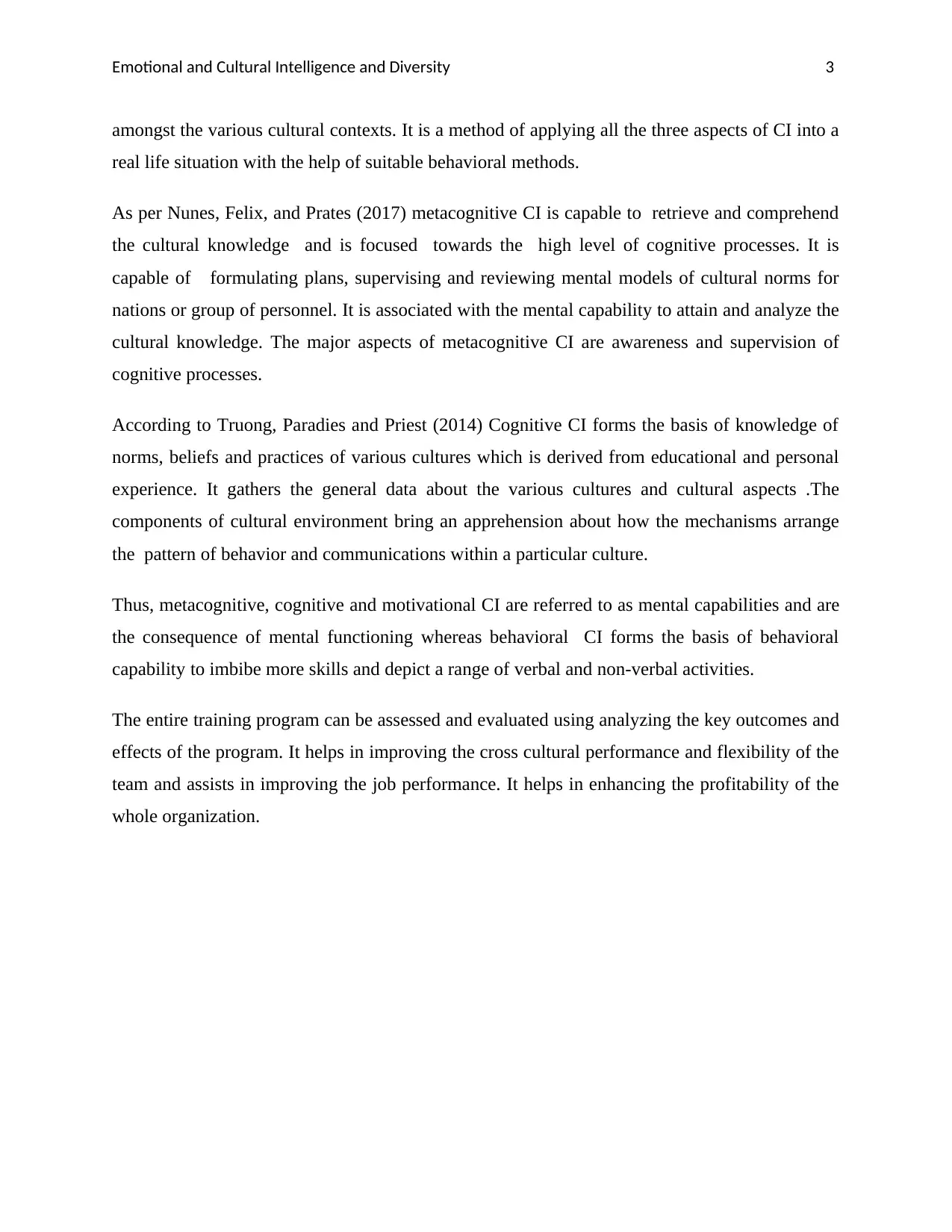
Emotional and Cultural Intelligence and Diversity 3
amongst the various cultural contexts. It is a method of applying all the three aspects of CI into a
real life situation with the help of suitable behavioral methods.
As per Nunes, Felix, and Prates (2017) metacognitive CI is capable to retrieve and comprehend
the cultural knowledge and is focused towards the high level of cognitive processes. It is
capable of formulating plans, supervising and reviewing mental models of cultural norms for
nations or group of personnel. It is associated with the mental capability to attain and analyze the
cultural knowledge. The major aspects of metacognitive CI are awareness and supervision of
cognitive processes.
According to Truong, Paradies and Priest (2014) Cognitive CI forms the basis of knowledge of
norms, beliefs and practices of various cultures which is derived from educational and personal
experience. It gathers the general data about the various cultures and cultural aspects .The
components of cultural environment bring an apprehension about how the mechanisms arrange
the pattern of behavior and communications within a particular culture.
Thus, metacognitive, cognitive and motivational CI are referred to as mental capabilities and are
the consequence of mental functioning whereas behavioral CI forms the basis of behavioral
capability to imbibe more skills and depict a range of verbal and non-verbal activities.
The entire training program can be assessed and evaluated using analyzing the key outcomes and
effects of the program. It helps in improving the cross cultural performance and flexibility of the
team and assists in improving the job performance. It helps in enhancing the profitability of the
whole organization.
amongst the various cultural contexts. It is a method of applying all the three aspects of CI into a
real life situation with the help of suitable behavioral methods.
As per Nunes, Felix, and Prates (2017) metacognitive CI is capable to retrieve and comprehend
the cultural knowledge and is focused towards the high level of cognitive processes. It is
capable of formulating plans, supervising and reviewing mental models of cultural norms for
nations or group of personnel. It is associated with the mental capability to attain and analyze the
cultural knowledge. The major aspects of metacognitive CI are awareness and supervision of
cognitive processes.
According to Truong, Paradies and Priest (2014) Cognitive CI forms the basis of knowledge of
norms, beliefs and practices of various cultures which is derived from educational and personal
experience. It gathers the general data about the various cultures and cultural aspects .The
components of cultural environment bring an apprehension about how the mechanisms arrange
the pattern of behavior and communications within a particular culture.
Thus, metacognitive, cognitive and motivational CI are referred to as mental capabilities and are
the consequence of mental functioning whereas behavioral CI forms the basis of behavioral
capability to imbibe more skills and depict a range of verbal and non-verbal activities.
The entire training program can be assessed and evaluated using analyzing the key outcomes and
effects of the program. It helps in improving the cross cultural performance and flexibility of the
team and assists in improving the job performance. It helps in enhancing the profitability of the
whole organization.
Paraphrase This Document
Need a fresh take? Get an instant paraphrase of this document with our AI Paraphraser
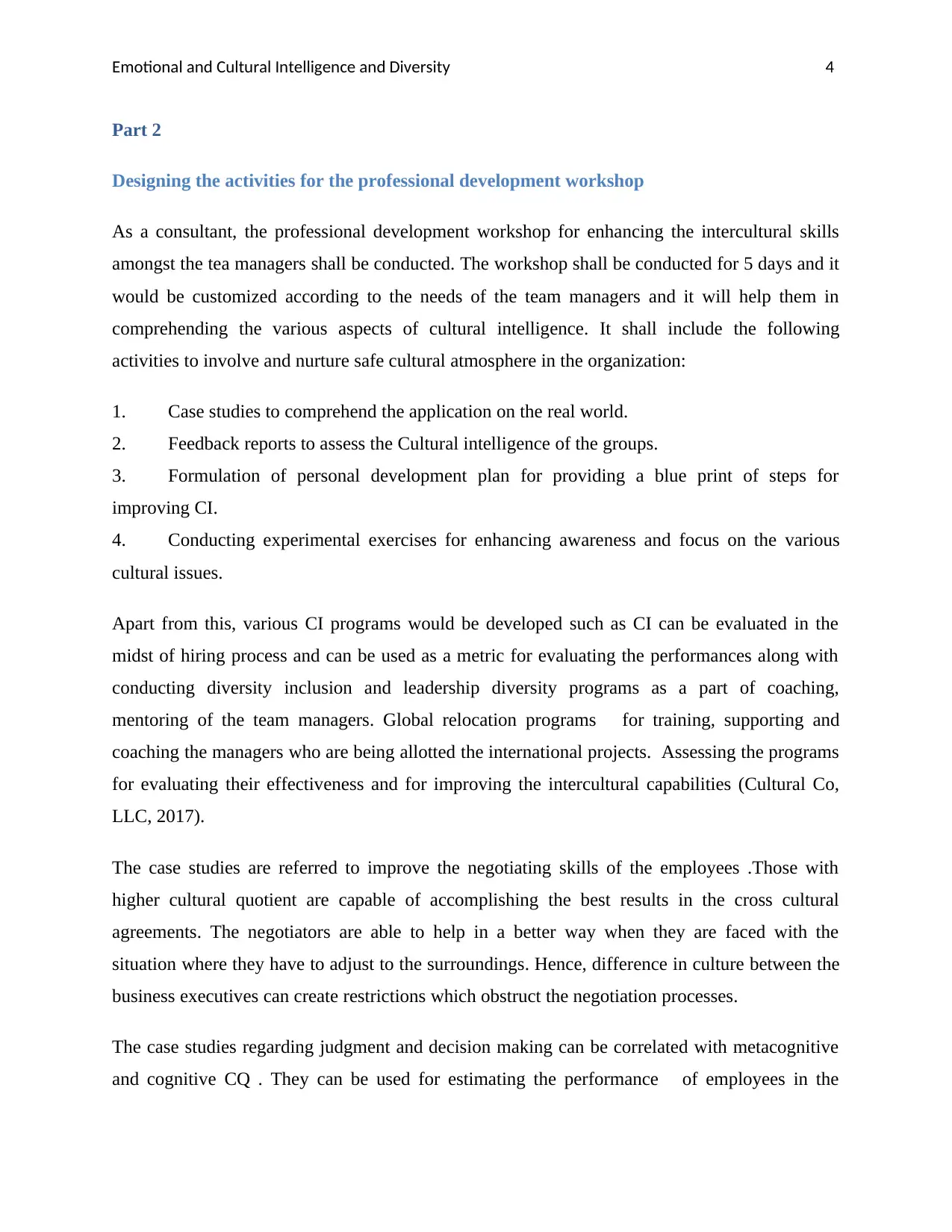
Emotional and Cultural Intelligence and Diversity 4
Part 2
Designing the activities for the professional development workshop
As a consultant, the professional development workshop for enhancing the intercultural skills
amongst the tea managers shall be conducted. The workshop shall be conducted for 5 days and it
would be customized according to the needs of the team managers and it will help them in
comprehending the various aspects of cultural intelligence. It shall include the following
activities to involve and nurture safe cultural atmosphere in the organization:
1. Case studies to comprehend the application on the real world.
2. Feedback reports to assess the Cultural intelligence of the groups.
3. Formulation of personal development plan for providing a blue print of steps for
improving CI.
4. Conducting experimental exercises for enhancing awareness and focus on the various
cultural issues.
Apart from this, various CI programs would be developed such as CI can be evaluated in the
midst of hiring process and can be used as a metric for evaluating the performances along with
conducting diversity inclusion and leadership diversity programs as a part of coaching,
mentoring of the team managers. Global relocation programs for training, supporting and
coaching the managers who are being allotted the international projects. Assessing the programs
for evaluating their effectiveness and for improving the intercultural capabilities (Cultural Co,
LLC, 2017).
The case studies are referred to improve the negotiating skills of the employees .Those with
higher cultural quotient are capable of accomplishing the best results in the cross cultural
agreements. The negotiators are able to help in a better way when they are faced with the
situation where they have to adjust to the surroundings. Hence, difference in culture between the
business executives can create restrictions which obstruct the negotiation processes.
The case studies regarding judgment and decision making can be correlated with metacognitive
and cognitive CQ . They can be used for estimating the performance of employees in the
Part 2
Designing the activities for the professional development workshop
As a consultant, the professional development workshop for enhancing the intercultural skills
amongst the tea managers shall be conducted. The workshop shall be conducted for 5 days and it
would be customized according to the needs of the team managers and it will help them in
comprehending the various aspects of cultural intelligence. It shall include the following
activities to involve and nurture safe cultural atmosphere in the organization:
1. Case studies to comprehend the application on the real world.
2. Feedback reports to assess the Cultural intelligence of the groups.
3. Formulation of personal development plan for providing a blue print of steps for
improving CI.
4. Conducting experimental exercises for enhancing awareness and focus on the various
cultural issues.
Apart from this, various CI programs would be developed such as CI can be evaluated in the
midst of hiring process and can be used as a metric for evaluating the performances along with
conducting diversity inclusion and leadership diversity programs as a part of coaching,
mentoring of the team managers. Global relocation programs for training, supporting and
coaching the managers who are being allotted the international projects. Assessing the programs
for evaluating their effectiveness and for improving the intercultural capabilities (Cultural Co,
LLC, 2017).
The case studies are referred to improve the negotiating skills of the employees .Those with
higher cultural quotient are capable of accomplishing the best results in the cross cultural
agreements. The negotiators are able to help in a better way when they are faced with the
situation where they have to adjust to the surroundings. Hence, difference in culture between the
business executives can create restrictions which obstruct the negotiation processes.
The case studies regarding judgment and decision making can be correlated with metacognitive
and cognitive CQ . They can be used for estimating the performance of employees in the
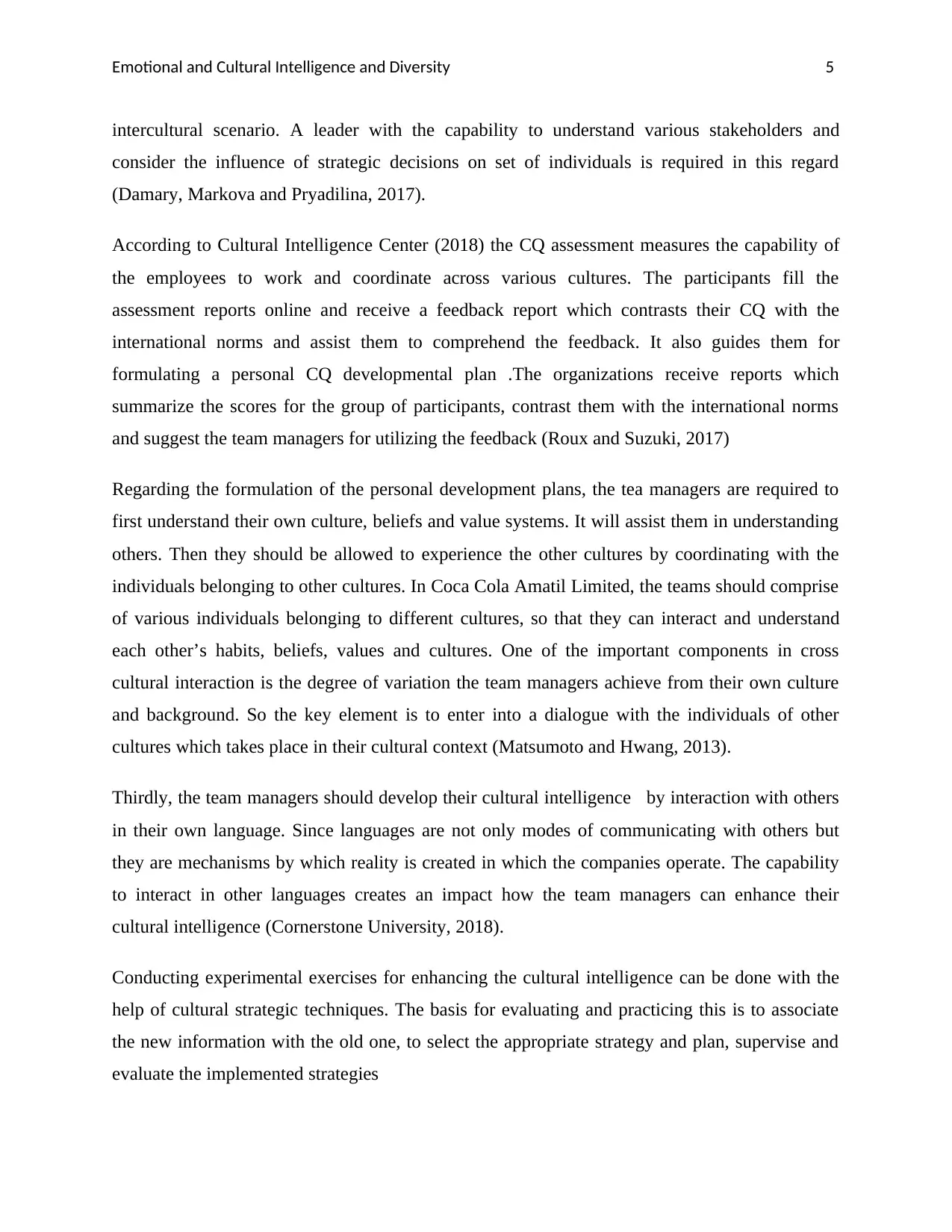
Emotional and Cultural Intelligence and Diversity 5
intercultural scenario. A leader with the capability to understand various stakeholders and
consider the influence of strategic decisions on set of individuals is required in this regard
(Damary, Markova and Pryadilina, 2017).
According to Cultural Intelligence Center (2018) the CQ assessment measures the capability of
the employees to work and coordinate across various cultures. The participants fill the
assessment reports online and receive a feedback report which contrasts their CQ with the
international norms and assist them to comprehend the feedback. It also guides them for
formulating a personal CQ developmental plan .The organizations receive reports which
summarize the scores for the group of participants, contrast them with the international norms
and suggest the team managers for utilizing the feedback (Roux and Suzuki, 2017)
Regarding the formulation of the personal development plans, the tea managers are required to
first understand their own culture, beliefs and value systems. It will assist them in understanding
others. Then they should be allowed to experience the other cultures by coordinating with the
individuals belonging to other cultures. In Coca Cola Amatil Limited, the teams should comprise
of various individuals belonging to different cultures, so that they can interact and understand
each other’s habits, beliefs, values and cultures. One of the important components in cross
cultural interaction is the degree of variation the team managers achieve from their own culture
and background. So the key element is to enter into a dialogue with the individuals of other
cultures which takes place in their cultural context (Matsumoto and Hwang, 2013).
Thirdly, the team managers should develop their cultural intelligence by interaction with others
in their own language. Since languages are not only modes of communicating with others but
they are mechanisms by which reality is created in which the companies operate. The capability
to interact in other languages creates an impact how the team managers can enhance their
cultural intelligence (Cornerstone University, 2018).
Conducting experimental exercises for enhancing the cultural intelligence can be done with the
help of cultural strategic techniques. The basis for evaluating and practicing this is to associate
the new information with the old one, to select the appropriate strategy and plan, supervise and
evaluate the implemented strategies
intercultural scenario. A leader with the capability to understand various stakeholders and
consider the influence of strategic decisions on set of individuals is required in this regard
(Damary, Markova and Pryadilina, 2017).
According to Cultural Intelligence Center (2018) the CQ assessment measures the capability of
the employees to work and coordinate across various cultures. The participants fill the
assessment reports online and receive a feedback report which contrasts their CQ with the
international norms and assist them to comprehend the feedback. It also guides them for
formulating a personal CQ developmental plan .The organizations receive reports which
summarize the scores for the group of participants, contrast them with the international norms
and suggest the team managers for utilizing the feedback (Roux and Suzuki, 2017)
Regarding the formulation of the personal development plans, the tea managers are required to
first understand their own culture, beliefs and value systems. It will assist them in understanding
others. Then they should be allowed to experience the other cultures by coordinating with the
individuals belonging to other cultures. In Coca Cola Amatil Limited, the teams should comprise
of various individuals belonging to different cultures, so that they can interact and understand
each other’s habits, beliefs, values and cultures. One of the important components in cross
cultural interaction is the degree of variation the team managers achieve from their own culture
and background. So the key element is to enter into a dialogue with the individuals of other
cultures which takes place in their cultural context (Matsumoto and Hwang, 2013).
Thirdly, the team managers should develop their cultural intelligence by interaction with others
in their own language. Since languages are not only modes of communicating with others but
they are mechanisms by which reality is created in which the companies operate. The capability
to interact in other languages creates an impact how the team managers can enhance their
cultural intelligence (Cornerstone University, 2018).
Conducting experimental exercises for enhancing the cultural intelligence can be done with the
help of cultural strategic techniques. The basis for evaluating and practicing this is to associate
the new information with the old one, to select the appropriate strategy and plan, supervise and
evaluate the implemented strategies
⊘ This is a preview!⊘
Do you want full access?
Subscribe today to unlock all pages.

Trusted by 1+ million students worldwide
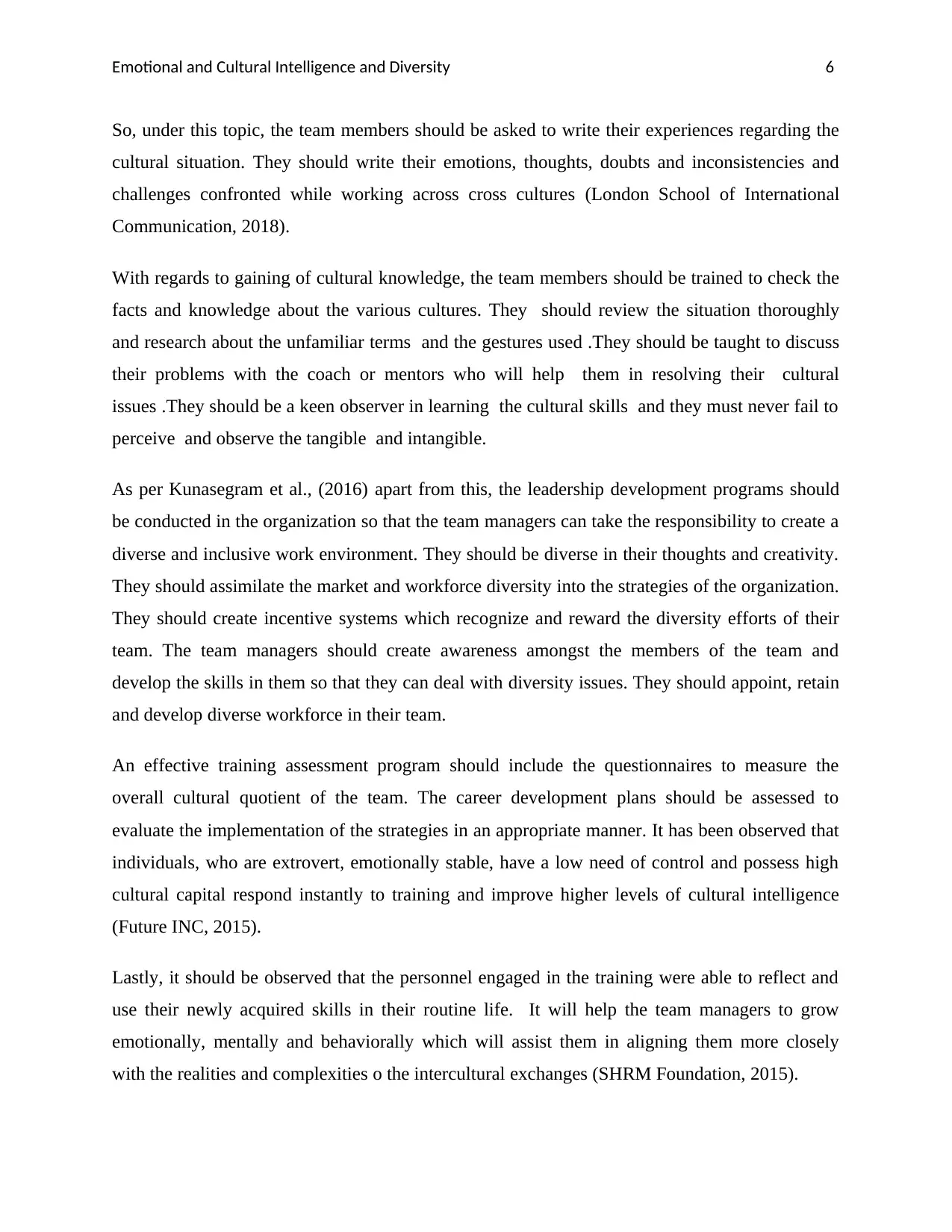
Emotional and Cultural Intelligence and Diversity 6
So, under this topic, the team members should be asked to write their experiences regarding the
cultural situation. They should write their emotions, thoughts, doubts and inconsistencies and
challenges confronted while working across cross cultures (London School of International
Communication, 2018).
With regards to gaining of cultural knowledge, the team members should be trained to check the
facts and knowledge about the various cultures. They should review the situation thoroughly
and research about the unfamiliar terms and the gestures used .They should be taught to discuss
their problems with the coach or mentors who will help them in resolving their cultural
issues .They should be a keen observer in learning the cultural skills and they must never fail to
perceive and observe the tangible and intangible.
As per Kunasegram et al., (2016) apart from this, the leadership development programs should
be conducted in the organization so that the team managers can take the responsibility to create a
diverse and inclusive work environment. They should be diverse in their thoughts and creativity.
They should assimilate the market and workforce diversity into the strategies of the organization.
They should create incentive systems which recognize and reward the diversity efforts of their
team. The team managers should create awareness amongst the members of the team and
develop the skills in them so that they can deal with diversity issues. They should appoint, retain
and develop diverse workforce in their team.
An effective training assessment program should include the questionnaires to measure the
overall cultural quotient of the team. The career development plans should be assessed to
evaluate the implementation of the strategies in an appropriate manner. It has been observed that
individuals, who are extrovert, emotionally stable, have a low need of control and possess high
cultural capital respond instantly to training and improve higher levels of cultural intelligence
(Future INC, 2015).
Lastly, it should be observed that the personnel engaged in the training were able to reflect and
use their newly acquired skills in their routine life. It will help the team managers to grow
emotionally, mentally and behaviorally which will assist them in aligning them more closely
with the realities and complexities o the intercultural exchanges (SHRM Foundation, 2015).
So, under this topic, the team members should be asked to write their experiences regarding the
cultural situation. They should write their emotions, thoughts, doubts and inconsistencies and
challenges confronted while working across cross cultures (London School of International
Communication, 2018).
With regards to gaining of cultural knowledge, the team members should be trained to check the
facts and knowledge about the various cultures. They should review the situation thoroughly
and research about the unfamiliar terms and the gestures used .They should be taught to discuss
their problems with the coach or mentors who will help them in resolving their cultural
issues .They should be a keen observer in learning the cultural skills and they must never fail to
perceive and observe the tangible and intangible.
As per Kunasegram et al., (2016) apart from this, the leadership development programs should
be conducted in the organization so that the team managers can take the responsibility to create a
diverse and inclusive work environment. They should be diverse in their thoughts and creativity.
They should assimilate the market and workforce diversity into the strategies of the organization.
They should create incentive systems which recognize and reward the diversity efforts of their
team. The team managers should create awareness amongst the members of the team and
develop the skills in them so that they can deal with diversity issues. They should appoint, retain
and develop diverse workforce in their team.
An effective training assessment program should include the questionnaires to measure the
overall cultural quotient of the team. The career development plans should be assessed to
evaluate the implementation of the strategies in an appropriate manner. It has been observed that
individuals, who are extrovert, emotionally stable, have a low need of control and possess high
cultural capital respond instantly to training and improve higher levels of cultural intelligence
(Future INC, 2015).
Lastly, it should be observed that the personnel engaged in the training were able to reflect and
use their newly acquired skills in their routine life. It will help the team managers to grow
emotionally, mentally and behaviorally which will assist them in aligning them more closely
with the realities and complexities o the intercultural exchanges (SHRM Foundation, 2015).
Paraphrase This Document
Need a fresh take? Get an instant paraphrase of this document with our AI Paraphraser
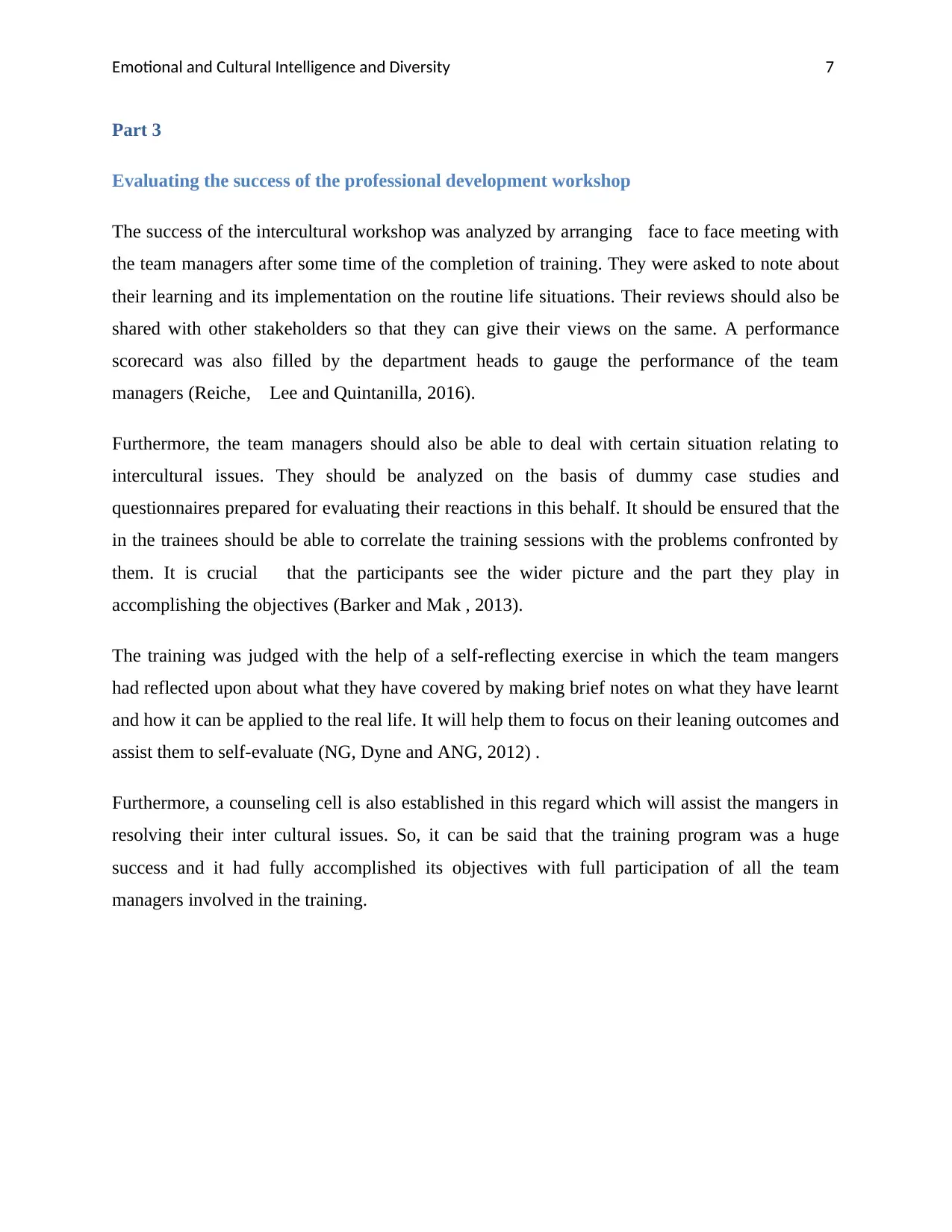
Emotional and Cultural Intelligence and Diversity 7
Part 3
Evaluating the success of the professional development workshop
The success of the intercultural workshop was analyzed by arranging face to face meeting with
the team managers after some time of the completion of training. They were asked to note about
their learning and its implementation on the routine life situations. Their reviews should also be
shared with other stakeholders so that they can give their views on the same. A performance
scorecard was also filled by the department heads to gauge the performance of the team
managers (Reiche, Lee and Quintanilla, 2016).
Furthermore, the team managers should also be able to deal with certain situation relating to
intercultural issues. They should be analyzed on the basis of dummy case studies and
questionnaires prepared for evaluating their reactions in this behalf. It should be ensured that the
in the trainees should be able to correlate the training sessions with the problems confronted by
them. It is crucial that the participants see the wider picture and the part they play in
accomplishing the objectives (Barker and Mak , 2013).
The training was judged with the help of a self-reflecting exercise in which the team mangers
had reflected upon about what they have covered by making brief notes on what they have learnt
and how it can be applied to the real life. It will help them to focus on their leaning outcomes and
assist them to self-evaluate (NG, Dyne and ANG, 2012) .
Furthermore, a counseling cell is also established in this regard which will assist the mangers in
resolving their inter cultural issues. So, it can be said that the training program was a huge
success and it had fully accomplished its objectives with full participation of all the team
managers involved in the training.
Part 3
Evaluating the success of the professional development workshop
The success of the intercultural workshop was analyzed by arranging face to face meeting with
the team managers after some time of the completion of training. They were asked to note about
their learning and its implementation on the routine life situations. Their reviews should also be
shared with other stakeholders so that they can give their views on the same. A performance
scorecard was also filled by the department heads to gauge the performance of the team
managers (Reiche, Lee and Quintanilla, 2016).
Furthermore, the team managers should also be able to deal with certain situation relating to
intercultural issues. They should be analyzed on the basis of dummy case studies and
questionnaires prepared for evaluating their reactions in this behalf. It should be ensured that the
in the trainees should be able to correlate the training sessions with the problems confronted by
them. It is crucial that the participants see the wider picture and the part they play in
accomplishing the objectives (Barker and Mak , 2013).
The training was judged with the help of a self-reflecting exercise in which the team mangers
had reflected upon about what they have covered by making brief notes on what they have learnt
and how it can be applied to the real life. It will help them to focus on their leaning outcomes and
assist them to self-evaluate (NG, Dyne and ANG, 2012) .
Furthermore, a counseling cell is also established in this regard which will assist the mangers in
resolving their inter cultural issues. So, it can be said that the training program was a huge
success and it had fully accomplished its objectives with full participation of all the team
managers involved in the training.
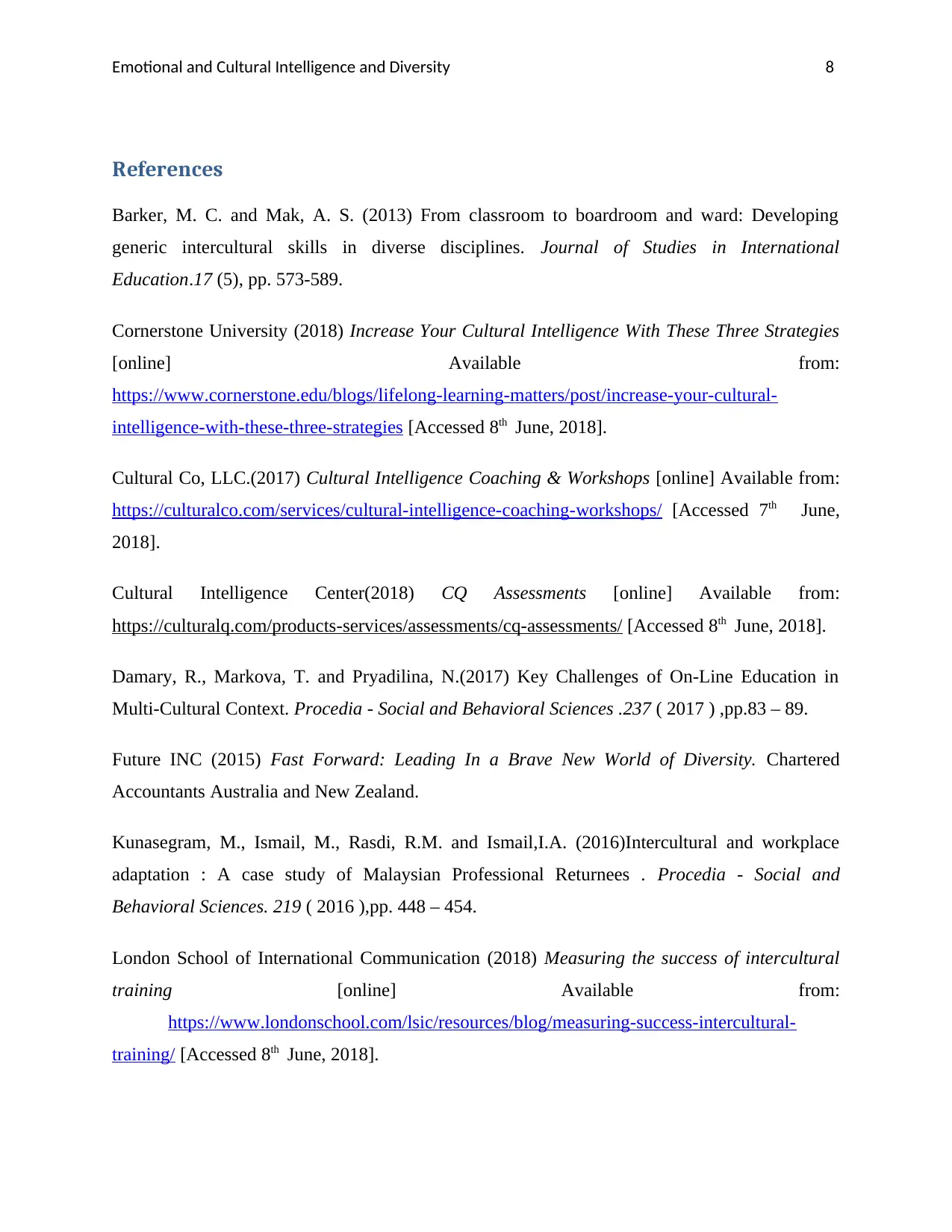
Emotional and Cultural Intelligence and Diversity 8
References
Barker, M. C. and Mak, A. S. (2013) From classroom to boardroom and ward: Developing
generic intercultural skills in diverse disciplines. Journal of Studies in International
Education.17 (5), pp. 573-589.
Cornerstone University (2018) Increase Your Cultural Intelligence With These Three Strategies
[online] Available from:
https://www.cornerstone.edu/blogs/lifelong-learning-matters/post/increase-your-cultural-
intelligence-with-these-three-strategies [Accessed 8th June, 2018].
Cultural Co, LLC.(2017) Cultural Intelligence Coaching & Workshops [online] Available from:
https://culturalco.com/services/cultural-intelligence-coaching-workshops/ [Accessed 7th June,
2018].
Cultural Intelligence Center(2018) CQ Assessments [online] Available from:
https://culturalq.com/products-services/assessments/cq-assessments/ [Accessed 8th June, 2018].
Damary, R., Markova, T. and Pryadilina, N.(2017) Key Challenges of On-Line Education in
Multi-Cultural Context. Procedia - Social and Behavioral Sciences .237 ( 2017 ) ,pp.83 – 89.
Future INC (2015) Fast Forward: Leading In a Brave New World of Diversity. Chartered
Accountants Australia and New Zealand.
Kunasegram, M., Ismail, M., Rasdi, R.M. and Ismail,I.A. (2016)Intercultural and workplace
adaptation : A case study of Malaysian Professional Returnees . Procedia - Social and
Behavioral Sciences. 219 ( 2016 ),pp. 448 – 454.
London School of International Communication (2018) Measuring the success of intercultural
training [online] Available from:
https://www.londonschool.com/lsic/resources/blog/measuring-success-intercultural-
training/ [Accessed 8th June, 2018].
References
Barker, M. C. and Mak, A. S. (2013) From classroom to boardroom and ward: Developing
generic intercultural skills in diverse disciplines. Journal of Studies in International
Education.17 (5), pp. 573-589.
Cornerstone University (2018) Increase Your Cultural Intelligence With These Three Strategies
[online] Available from:
https://www.cornerstone.edu/blogs/lifelong-learning-matters/post/increase-your-cultural-
intelligence-with-these-three-strategies [Accessed 8th June, 2018].
Cultural Co, LLC.(2017) Cultural Intelligence Coaching & Workshops [online] Available from:
https://culturalco.com/services/cultural-intelligence-coaching-workshops/ [Accessed 7th June,
2018].
Cultural Intelligence Center(2018) CQ Assessments [online] Available from:
https://culturalq.com/products-services/assessments/cq-assessments/ [Accessed 8th June, 2018].
Damary, R., Markova, T. and Pryadilina, N.(2017) Key Challenges of On-Line Education in
Multi-Cultural Context. Procedia - Social and Behavioral Sciences .237 ( 2017 ) ,pp.83 – 89.
Future INC (2015) Fast Forward: Leading In a Brave New World of Diversity. Chartered
Accountants Australia and New Zealand.
Kunasegram, M., Ismail, M., Rasdi, R.M. and Ismail,I.A. (2016)Intercultural and workplace
adaptation : A case study of Malaysian Professional Returnees . Procedia - Social and
Behavioral Sciences. 219 ( 2016 ),pp. 448 – 454.
London School of International Communication (2018) Measuring the success of intercultural
training [online] Available from:
https://www.londonschool.com/lsic/resources/blog/measuring-success-intercultural-
training/ [Accessed 8th June, 2018].
⊘ This is a preview!⊘
Do you want full access?
Subscribe today to unlock all pages.

Trusted by 1+ million students worldwide
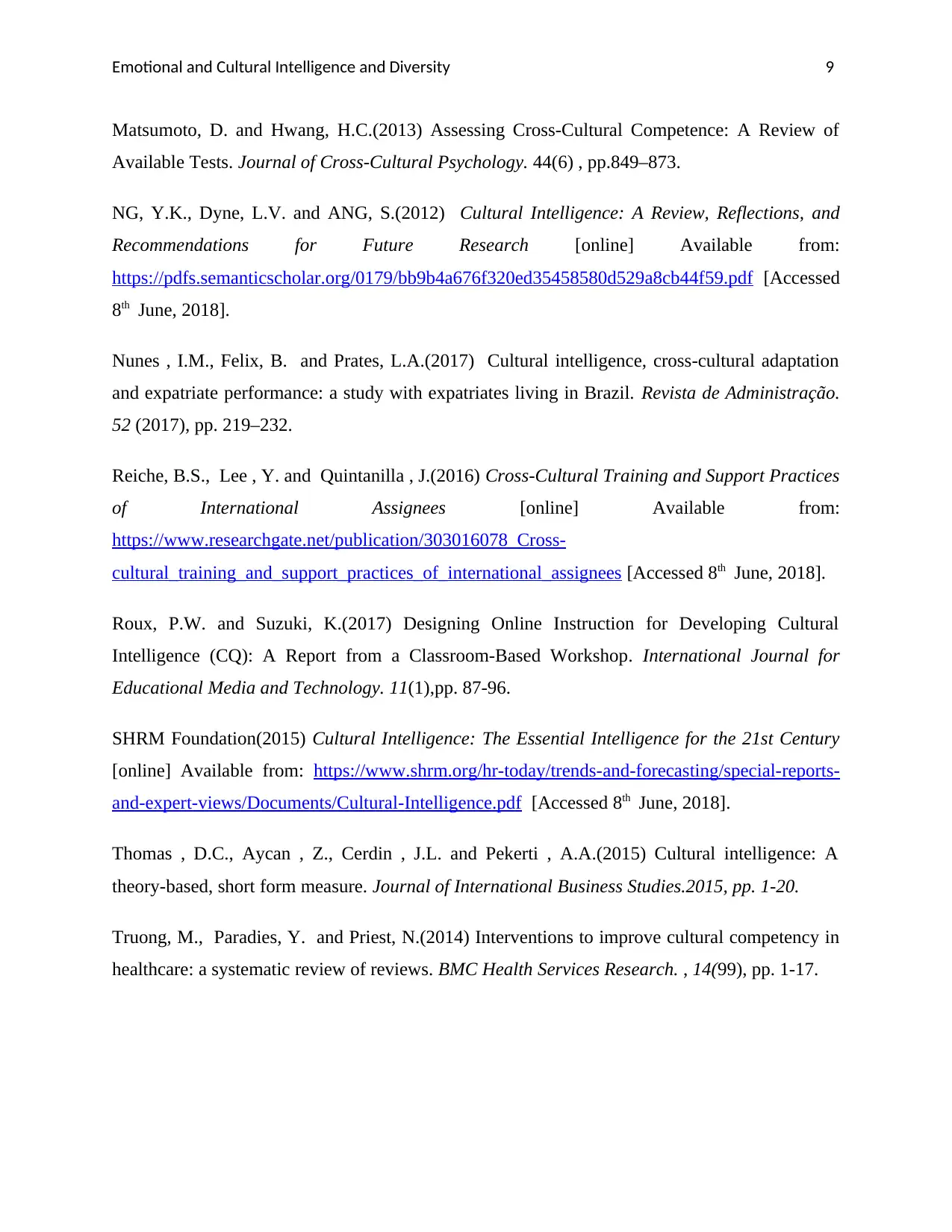
Emotional and Cultural Intelligence and Diversity 9
Matsumoto, D. and Hwang, H.C.(2013) Assessing Cross-Cultural Competence: A Review of
Available Tests. Journal of Cross-Cultural Psychology. 44(6) , pp.849–873.
NG, Y.K., Dyne, L.V. and ANG, S.(2012) Cultural Intelligence: A Review, Reflections, and
Recommendations for Future Research [online] Available from:
https://pdfs.semanticscholar.org/0179/bb9b4a676f320ed35458580d529a8cb44f59.pdf [Accessed
8th June, 2018].
Nunes , I.M., Felix, B. and Prates, L.A.(2017) Cultural intelligence, cross-cultural adaptation
and expatriate performance: a study with expatriates living in Brazil. Revista de Administração.
52 (2017), pp. 219–232.
Reiche, B.S., Lee , Y. and Quintanilla , J.(2016) Cross-Cultural Training and Support Practices
of International Assignees [online] Available from:
https://www.researchgate.net/publication/303016078_Cross-
cultural_training_and_support_practices_of_international_assignees [Accessed 8th June, 2018].
Roux, P.W. and Suzuki, K.(2017) Designing Online Instruction for Developing Cultural
Intelligence (CQ): A Report from a Classroom-Based Workshop. International Journal for
Educational Media and Technology. 11(1),pp. 87-96.
SHRM Foundation(2015) Cultural Intelligence: The Essential Intelligence for the 21st Century
[online] Available from: https://www.shrm.org/hr-today/trends-and-forecasting/special-reports-
and-expert-views/Documents/Cultural-Intelligence.pdf [Accessed 8th June, 2018].
Thomas , D.C., Aycan , Z., Cerdin , J.L. and Pekerti , A.A.(2015) Cultural intelligence: A
theory-based, short form measure. Journal of International Business Studies.2015, pp. 1-20.
Truong, M., Paradies, Y. and Priest, N.(2014) Interventions to improve cultural competency in
healthcare: a systematic review of reviews. BMC Health Services Research. , 14(99), pp. 1-17.
Matsumoto, D. and Hwang, H.C.(2013) Assessing Cross-Cultural Competence: A Review of
Available Tests. Journal of Cross-Cultural Psychology. 44(6) , pp.849–873.
NG, Y.K., Dyne, L.V. and ANG, S.(2012) Cultural Intelligence: A Review, Reflections, and
Recommendations for Future Research [online] Available from:
https://pdfs.semanticscholar.org/0179/bb9b4a676f320ed35458580d529a8cb44f59.pdf [Accessed
8th June, 2018].
Nunes , I.M., Felix, B. and Prates, L.A.(2017) Cultural intelligence, cross-cultural adaptation
and expatriate performance: a study with expatriates living in Brazil. Revista de Administração.
52 (2017), pp. 219–232.
Reiche, B.S., Lee , Y. and Quintanilla , J.(2016) Cross-Cultural Training and Support Practices
of International Assignees [online] Available from:
https://www.researchgate.net/publication/303016078_Cross-
cultural_training_and_support_practices_of_international_assignees [Accessed 8th June, 2018].
Roux, P.W. and Suzuki, K.(2017) Designing Online Instruction for Developing Cultural
Intelligence (CQ): A Report from a Classroom-Based Workshop. International Journal for
Educational Media and Technology. 11(1),pp. 87-96.
SHRM Foundation(2015) Cultural Intelligence: The Essential Intelligence for the 21st Century
[online] Available from: https://www.shrm.org/hr-today/trends-and-forecasting/special-reports-
and-expert-views/Documents/Cultural-Intelligence.pdf [Accessed 8th June, 2018].
Thomas , D.C., Aycan , Z., Cerdin , J.L. and Pekerti , A.A.(2015) Cultural intelligence: A
theory-based, short form measure. Journal of International Business Studies.2015, pp. 1-20.
Truong, M., Paradies, Y. and Priest, N.(2014) Interventions to improve cultural competency in
healthcare: a systematic review of reviews. BMC Health Services Research. , 14(99), pp. 1-17.
Paraphrase This Document
Need a fresh take? Get an instant paraphrase of this document with our AI Paraphraser
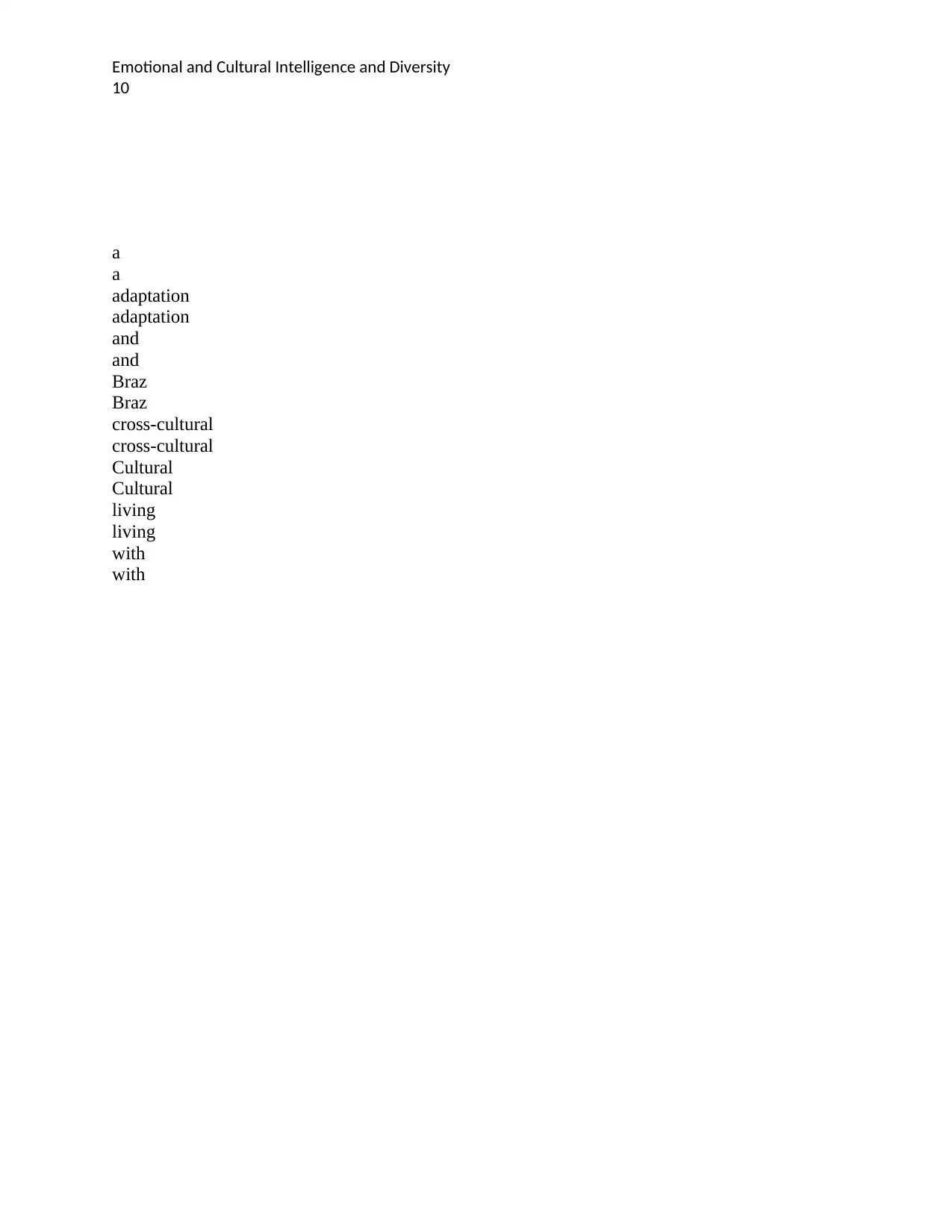
Emotional and Cultural Intelligence and Diversity
10
a
a
adaptation
adaptation
and
and
Braz
Braz
cross-cultural
cross-cultural
Cultural
Cultural
living
living
with
with
10
a
a
adaptation
adaptation
and
and
Braz
Braz
cross-cultural
cross-cultural
Cultural
Cultural
living
living
with
with
1 out of 11
Related Documents
Your All-in-One AI-Powered Toolkit for Academic Success.
+13062052269
info@desklib.com
Available 24*7 on WhatsApp / Email
![[object Object]](/_next/static/media/star-bottom.7253800d.svg)
Unlock your academic potential
Copyright © 2020–2026 A2Z Services. All Rights Reserved. Developed and managed by ZUCOL.





